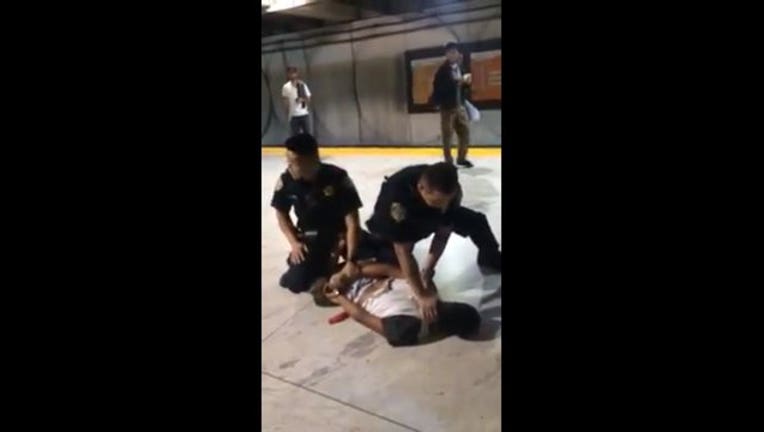BART board declines to reduce funding for agency's police department

Photo of BART police arresting suspect at Embarcadero Station platform. (photo courtesy Edwin Lindo)
OAKLAND, Calif. - The BART Board of Directors on Thursday acknowledged the value in reforming its law enforcement agency but declined to reduce or eliminate funding for BART police in the agency's proposed fiscal year 2021 budget.
BART has not been spared from calls across the Bay Area and the country at large to drastically reduce local police budgets following the death of George Floyd in Minneapolis last month and the ensuing protests.
Criminal justice advocates argue that police budgets have ballooned out of control in recent years and reducing them in addition to demilitarizing law enforcement agencies and reducing their scope could help curb instances of police brutality.
While BART's proposed fiscal year 2021 budget includes a one-year delay of new police hires, saving the agency about $4 million as part of a hiring freeze totaling $36 million in cuts agencywide, some members of the public demanded BART eliminate its law enforcement entirely.
Director Debora Allen said blame placed on BART police officers over allegations of unnecessary policy enforcement and racism is misguided and officers are only doing their job of enforcing established laws.
Allen also argued that riders criminalize themselves when they break systemwide rules and laws such as eating on station platforms and refusing to comply with orders from law enforcement officers.
"For those of you who don't think BART PD does enough for public safety, wait 'til you see the result if they are gone or substantially diminished," Allen said, adding that the system would become "a continuous place of mayhem" without BART police.
Board Directors Janice Li, Rebecca Saltzman and John McPartland all distanced themselves from Allen's comments, with Saltzman urging all members of the board to be thoughtful and respectful of riders in the system, particularly people of color, who may feel victimized by BART police.
Later in the meeting, board President Lateefah Simon, the only black member of the board, issued the strongest rebuke of Allen's comments.
"When I hear the dog whistles, that are consistent with a political agenda that uplifts structural racism, that black men and women who succumb to unlawful use of force by law enforcement were to blame, it is unconscionable and it is racist," she said.
"You will not, in this meeting, as long as I'm president, blame the dead for the lack of responsibility of many law enforcement leaders for getting it right."
Li, whose district includes central San Francisco, said that while she supports the agency's proposed budget, she is rethinking the role BART police can and should play in the system, particularly in enforcing and punishing fare evasion and ensuring that riders feel safe in the system.
"I have a lot more work to do," Li said. "I have to really listen to the needs of our community and I'm wholly committed to listening and acting upon the demands of the communities BART serves."
Last month, BART General Manager Bob Powers called the proposed budget "precariously balanced," with federal funding support shoring up the agencies losses in fare revenue during the COVID-19 coronavirus pandemic.
The budget includes roughly $190 million in total cuts compared to the $1.016 billion preliminary budget that the board reviewed in mid-May.
BART officials have touted that the new proposed budget does not include layoffs or furloughs for any employees.
Criminal justice advocates in the Bay Area have argued that reducing the agency's police budget could not only free up funding to balance the budget without making such harsh cuts but also allow BART to move toward eliminating the need to collect fares altogether.
McPartland suggested that while those suggestions may be well-intentioned, they could be coming from a place of emotion and pain in lieu of rationality.
"We need to have a thought-through response that summarizes the need for the law enforcement in relation to the fare gates," he said. "The people that are speaking with so much anger and venom are also venting from the standpoint of their frustration."
Saltzman suggested the board take a cue from members of the public who suggested modifying BART police's scope of operation going forward.
"Some of what people were talking about, having police officers focus on the real crimes and figuring out ways to have unarmed people focusing on things like masks, that really resonated with me," she said.
The BART board is expected to vote on the proposed budget at its June 25 meeting. The budget would then go into effect when the fiscal year begins July 1.

